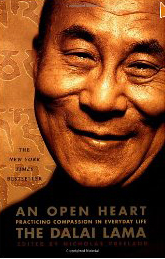Dalai Lama
Books: Religion | Philosophy | Ethics
Ethics for the New Millennium (1999), An Open Heart: Practicing Compassion in Everyday Life (2002)
An Open Heart: Practicing Compassion in Everyday Life (2002)
 Unlike the previous book I read by the Dalai Lama, this book only took me about nine months to read. They're not long books, I just tend to set them aside for something else, and then have to go back an re-read portions to get caught up again.
Unlike the previous book I read by the Dalai Lama, this book only took me about nine months to read. They're not long books, I just tend to set them aside for something else, and then have to go back an re-read portions to get caught up again.
The title is why I picked this book up, An Open Heart: Practicing Compassion in Everyday Life seems like a really good idea. I have a hard time being compassionate to people I dislike, so I figured it this book might be able to help me be less of a jerk. However, only time will tell if there was any measure of success.
As with his other book I read, An Open Heart: Practicing Compassion in Everyday Life is a short book, with stories about compassion and methods to help one become a better person. I cling to the belief that he must have some secret that he can impart, because he strikes me as one of the most compassionate, calm, centered people ever to grace the public eye. This could, of course, be a façade, but I somehow doubt it.
So I read, in hopes of learning something.
Most of what he says is practical, although the meditation is beyond me. It seems useful--very useful--but I can't begin to comprehend "emptying my mind." To me, that task is as daunting as being told to lift my car. I know that there are people who are strong enough to do such a thing, but for me such a task would be an impossibility.
Despite that, I plan on reading more of his books, for being reminded that we need to act compassionately is some small help.
Ethics for the New Millennium
 I'm finished. Really. It took a long time, but I'm finished I would read great large sections but then end up putting the book down for something else, forget about the book for awhile and then have to backtrack to get this gist of what I was reading. But that should not be taken as a negative review of the book, I in fact quite enjoyed it, but am rarely able to finish non-fiction books rapidly. Oddly enough I found this book extremely relaxing. Although I may be completely unable to control my temper or my emotions in the manner he describes, reading about the fact that it is possible for at least someone to do so, somehow makes my inability to do so seem more tolerable, which oddly enough is rather calming. There are plenty of lessons, but they are not overbearing, and although I seem to have an inability to follow the lessons, they do, in some small way help. I was particularly struck by the following, which is reinterpretation of a statement made by Jesus.
I'm finished. Really. It took a long time, but I'm finished I would read great large sections but then end up putting the book down for something else, forget about the book for awhile and then have to backtrack to get this gist of what I was reading. But that should not be taken as a negative review of the book, I in fact quite enjoyed it, but am rarely able to finish non-fiction books rapidly. Oddly enough I found this book extremely relaxing. Although I may be completely unable to control my temper or my emotions in the manner he describes, reading about the fact that it is possible for at least someone to do so, somehow makes my inability to do so seem more tolerable, which oddly enough is rather calming. There are plenty of lessons, but they are not overbearing, and although I seem to have an inability to follow the lessons, they do, in some small way help. I was particularly struck by the following, which is reinterpretation of a statement made by Jesus.
(I)t is far more useful to be aware of a single shortcoming in ourselves than it is to be aware of a thousand in somebody else. For when the fault is our own, we are in a position to correct it.
He does an excellent job of being ecumenical, which is very impressive for someone who is as religious as he is:
My meetings with many different sorts of people the world over have, however, helped me to realize that there are other faiths, and other cultures, no less capable than mine of enabling individuals to lead constructive and satisfying lives. What is more, I have come to the conclusion that whether or not a person is a religions believer does not matter much. Far more important is that they be a good human being.
...
(F)ollowers of one tradition will find that, just as in the case of their own, the teachings of others faiths are a source of both spiritual inspiration and of ethical guidance to their followers. It will also become clear that irrespective of doctrinal and other differences, all the major world religions are concerned with helping individuals to become good human beings. All emphasize love and compassion, patience, tolerance, forgiveness, humility, and so on, and all are capable of helping individuals develop these.
I somehow can not imagine the pope saying that.
